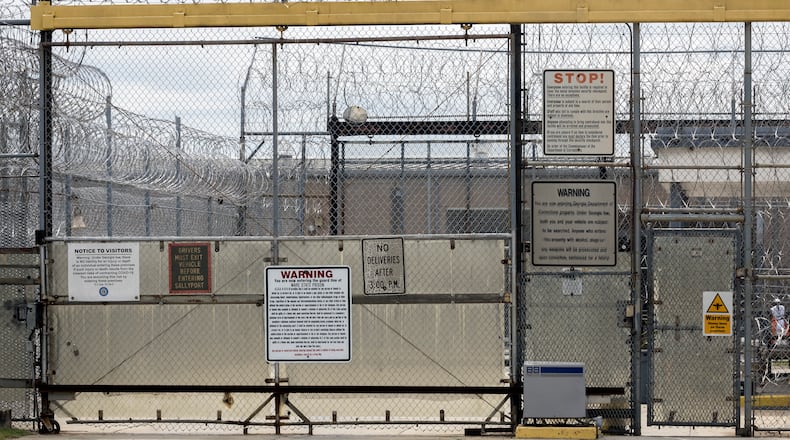The state Senate this month authorized a committee to take a deep dive into Georgia’s murderous prison system.
Just days later, the warden at Telfair State Prison got stabbed by an inmate during a shakedown by officials looking to unearth contraband in a dorm. Inmates jealously guard their illegal cellphones, weapons and drugs.
The incident underscored the dire state of Georgia’s prison system. Nothing says drastic changes are in order more than a warden getting shanked.
According to Department of Corrections numbers, Telfair is missing 76% of its essential workforce. There are just 36 correctional officers to do the work of 154. Again, three out of four guards are not there to watch 1,400 prisoners.
That means there are fatigued officers on mandatory overtime shifts, skeleton crews and a sense of systematic weakness that prisoners notice.
Telfair is not unusual. The department said its vacancy rate for correctional officers was 55% in fiscal 2023. In 2017, there were 5,478. Last year, 2,685. (There are also about 1,500 supervisory officers, which has largely remained the same since 2017.)
The annual turnover rate for guards was 40% in 2023.
That sounds bad. But it’s an improvement, the lowest rate in five years.
Into this crisis comes the Senate Supporting Safety and Welfare of All Individuals in the Department of Corrections Facilities Study Committee. Or, as it’s known, the SSSWAIDCFSC. It’s headed by Republican state Sen. Randy Robertson, a retired lawman from the Columbus area.
He said the committee needs to conduct a “deep dive into this without worrying about being called racist or heavy-handed.”
During our discussion, it was clear Robertson won’t fret about being labelled hard-nosed. “We have to,” he noted:
— “quit being politically correct,”
— “cut the (B.S),”
— “stop being willows and start being oaks.”
Remember, this is a guy who spent spent 30 years locking ‘em up, so as a tradesman, he likes his hammer.
A portion of the nearly 50,000 prisoners, Robertson said, are “good people who made bad choices. Those people should come out of prison as good, or better than they went in, not worse.”
But the rest, he figures it could be 70%, “are very bad men and women who rehabilitation is not on their to-do list.”
DOC classifies 74% of prisoners as “violent.”
Robertson says no prison service — rehabilitation, education, medical or mental health services — will work without safety and order.
If a house is burning, you must first extinguish the flames before remodeling the kitchen.
The initial goal is to hire more guards, which has been a trick. “Correctional officers are an after-thought,” he said. “It’s been seen by some people, unfortunately, as the kind of job you get if you can’t make it elsewhere.”
Credit: Arvin Temkar/AJC
Credit: Arvin Temkar/AJC
Robertson said higher salaries and benefits, as well as establishing a sense of pride in the work, is vital to recruiting.
John Albers, R-Roswell, head of the Senate’s Public Safety Committee, said Georgia’s prisons are “extremely violent places, war zones within wires. Correctional officers are those left battling that war.”
Many are not up to that struggle.
A powerful series of stories written by the AJC’s Carrie Teegardin and Danny Robbins found that guards — especially those caught smuggling in contraband — are often young job jumpers with financial problems.
I called Paul Wright, a former prisoner who has published Prison Legal News since 1990.
“The state is competing with Walmart for workers,” he said. “I can go to work for Walmart and no one will throw feces at me or try to kill me. And then they act surprised that no one wants to work in their prisons.”
“The systems in Georgia, Alabama, Florida, Louisiana and Mississippi are all dealing with this; they are imploding under the weight of corruption, mismanagement and brutality,” Wright said. “In those systems, the body count is going through the roof.”
Georgia prisons had 37 homicides in 2023 and 31 in 2022. In 2017, there were eight homicides and nine in 2018.
Credit: Screengrab of courtesy video
Credit: Screengrab of courtesy video
There were also 40 suicides in fiscal 2023.
I called Democratic state Sen. Josh McLaurin, the yin to Robertson’s yang.
In 2021, McLaurin and other legislators were turned away from a prison they showed up to tour unannounced.
He agrees Georgia must hire more staff and improve prison infrastructure. But there needs to be a change in culture, which will take time, he said. He noted that former Gov. Nathan Deal’s prison reform, helpful as it was, was just “a drop in the bucket.” There’s got to be a couple reform-minded governors in a row.
“You have to be humanely focused on those on the inside so there’s not a black hole that gangs can fill,” he said. “Most of the gang violence that (Gov.) Brian Kemp is trying to solve starts inside.”
”If we just throw these people away, all of us get less safe,” he said. “It’s cheaper to get people housing, jobs and education than to keep incarcerating them.”
McLaurin has raised his hand to be on the prison committee. But it’s unclear if Robertson wants to hear the Democratic senator’s arguments. “I think Josh is a single-issue person now and I think we need to broaden our horizons,” said Robertson, who wants to be an oak.
Hopefully the committee can see the forest for the trees.
About the Author
Keep Reading
The Latest
Featured





